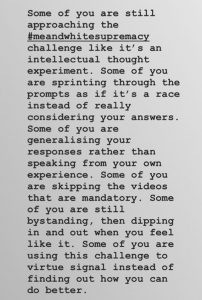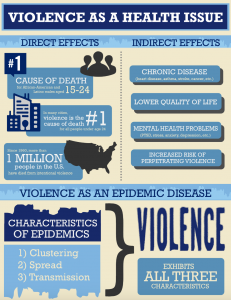
I think that’s one quote that can stop anyone in their tracks. I think it’s a quote that should stop everyone in their tracks.
I’ve been doing some deep soul-searching this summer. I am not sure if my soul-searching has necessarily been super intentional, but there’s been a force driving me to deal with some tough topics. I encountered an instagrammer/blogger named Layla Saad who was doing a 28-day “white supremacy” challenge throughout the month of July. I gathered it would be a good idea to do this challenge because of how uncomfortable the idea made me! Her topics were not always easy to swallow:
You & White Supremacy
You & White Fragility
You & Cultural Appropriation
You & Black Men, Women, and Children
You & Optical Allyship
You & White Feminism
You & White Saviorism
And the list goes on…
I have to be honest though, I failed the challenge in the sense that I didn’t post on Instagram in the conversations like I was meant to. Every day I looked at her posts and I pondered them. I tried to ask myself my real feelings regarding the topic. I tried to dig deep and admit truths to myself I had never realized. Some topics were easier for me to process than others, and I did try and process every day, but I didn’t do the challenge in the way I was instructed. I was a bystander. Therefore, I failed it. I am going to blame the lack of time to participate due to my summer schedule, but her comments on people’s posts also really intimidated me. She was open to calling people out and it seemed like unless someone admitted to being deeply racist or to be a supporter of white supremacy, they failed in responding to the prompt. That was hard for me. It is really hard to think of yourself in a kind light, and then to shift 180 degrees and force yourself into a negative light. To reckon yourself with such terrible acts of violence. I was not raised in a home that incited violence on anyone due to their background or race, and I kept using that as my defense! I was raised Adventist and I was taught to love. But the fact is, I was raised in a system that does incite violence, which means that my home and church did as well.


I know that seems confusing and I go in circles and circles admitting fault but then defending myself. In our session with Sujata she quoted Audre Lorde and said, “We need to learn to not be the oppressor before we can transform the world.” Audre’s quote and Sujata hit home for me. We all have seeds of the oppressive, and I’m in the midst of accepting that. I’m in the midst of relinquishing the fight of defending myself as good, and relinquishing to the fact that I have hurt. That I have benefitted from a system that oppresses others. I need to transform myself inwards by dissecting my understanding and education that I’ve received of the world, in order for me to be able to hold any true transformation on that same world.
Sujata gave us the example of Charlotte Bunch, a white, American feminist author, who was involved in the Vienna Tribunals and has made many notable contributions to the feminist field. Yet once, she said there was a global sisterhood. She was quickly critiqued at her blind thinking that women of color around the world could actually feel like sisters to white women. Was Charlotte well-intentioned? Of course. But did it come across terrible and hurt people in the end? Yes. I prodded Sujata with a question regarding this. “But how do I avoid what she did? How do I find my place? Do I ask questions? Listen?” And she left me with this advice which I want to leave you:
“You’re going to make blunders. You’re going to hurt people on your way to learning, but that’s what you must do. And just because people critique you and knock you down, you need to keep going. You need to continue the work to understand and to continue learning. That is the only way to transformation.”






















